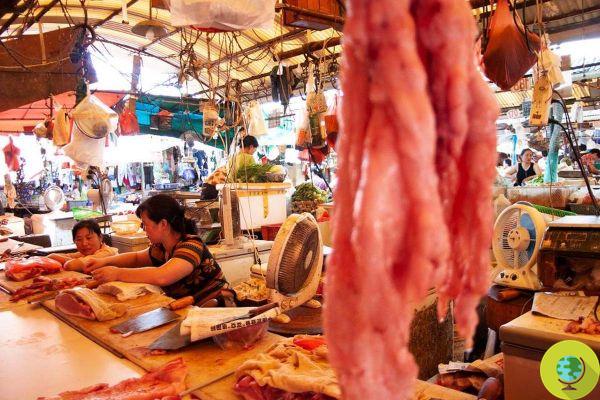
A WHO team visited one of Wuhan's largest wet markets, looking for useful information on the spread of the coronavirus
Don't store avocado like this: it's dangerousA team of WHO experts paid a visit yesterday to one of the wet markets in Whuan, currently closed and abandoned, the place from which the coronavirus would have originated. The goal: to investigate the origins of the pandemic and find useful clues about the spread of the virus.
They are now known all over the world. We are talking about the wet markets of Wuhan, places where live animals (including wild and exotic) are sold in questionable hygienic conditions. The coronavirus seems to have started from some of these markets, making a leap of species and passing from animal to man. We all know what happened next but there is still a lot to discover about the dynamics of the spread of the virus.
Precisely for this reason, on Sunday, a WHO team visited the Baishazhou market, one of the largest wet markets in Wuhan (closed to the public and fully disinfected), considered the epicenter of the pandemic, although subsequent studies have suggested that the virus may have started elsewhere.
The WHO experts, after having spent 14 days in quarantine as required by the protocol, visited different sections of the market surrounded by a large following of Chinese officials and representatives, as well as law enforcement agencies.
Peter Ben Embarek, the WHO team leader and food safety specialist, told CNN:
“Even if the place was somehow disinfected, all the shops are there - and the equipment is there. It gives you a good idea of the state of the market in terms of maintenance, infrastructure, hygiene, and the flow of goods and people. It is clear that something has happened in that market. But it could also be that other places played the same role, and that was only chosen because some doctors were smart enough to link some sporadic cases together. "
Ben Embarek also revealed that Chinese officials have provided important data on the flu, or flu-like diseases, identified by sophisticated Chinese disease surveillance systems in and around Hubei region in the months leading up to the December 2019 outbreak. Data that the WHO will need to look for useful links with what happened afterwards.
The team plans to visit hospitals, laboratories and markets. Field visits will include the Wuhan Institute of Virology, Huanan market, Wuhan CDC laboratory. They will speak with early responders and some of the first #COVID19 patients.https://t.co/Owd6GEBoAj
— World Health Organization (WHO) (@WHO) January 28, 2021
Peter Daszak, zoologist and president of the New York-based EcoHealth Alliance, described the visit to the Huanan market in a tweet on Sunday as “very informative and crucial for our joint teams to understand how the COVID epidemic as it began. to spread at the end of 2019 ".
Very important site visits today – a wholesale market first & Huanan Seafood Market just now. Very informative & critical for our joint teams to understand the epidemiology of COVID as it started to spread at the end of 2019. https://t.co/kERfcHFUOY
— Peter Daszak (@PeterDaszak) January 31, 2021
Professor Daszak further stated that:
“It is a shock to see the place. All the shops are empty, the equipment is still there. It's a bit disturbing ”.
The Huanan fish market could therefore offer some clues to the WHO team on the pattern of transmission of the virus. But the animal origin of the virus is still unknown and needs the efforts of scientists around the world, Wuhan virologist Yang Zhanqiu told the Global Times on Sunday.
The WHO team, with experience in veterinary practices, virology, food safety and epidemiology, has so far also visited two hospitals involved in the epidemic in China: the Wuhan Jinyintan Hospital and the Hubei Integrated Chinese and Western Medicine Hospital.
The experts then plan to visit the Wuhan Institute of Virology, which specializes in coronavirus, where the team will meet She Zhengli, the virologist known as "Batwoman" as she conducted a lengthy investigation into the coronavirus of bats which, according to scientists , is a close relative of SARS-COV2.
Fonte: CNN/Reuters
Read also:
- Coronavirus: What are the 'wet markets' that are causing the devastating viruses to develop in China
- Wet Chinese markets are still open: nine months after the Covid-19 pandemic, nothing has changed
- Wet market: for the WHO, wet markets should not be closed, despite their role in the pandemic
- Stop Wet Market! Now the UN is also calling for a worldwide ban on wet markets
- We close the wet markets forever! The petition with the shocking images of Asian wet markets


























